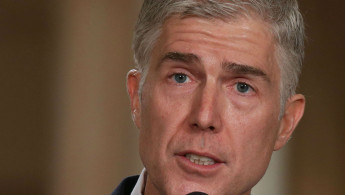Trump nominates conservative judge for vacant supreme court place
President Donald Trump has nominated federal appellate Judge Neil Gorsuch as his supreme court nominee, tilting the balance of the court back in the conservatives' favour.
Trump's pick would fill the long-vacant ninth position on the bench - empty since Antonin Scalia died in February 2016.
"Judge Gorsuch has outstanding legal skills, a brilliant mind, tremendous discipline, and has earned bipartisan support," Trump said at the White House.
"He will make an incredible justice as soon as the Senate confirms him," the new Republican leader added.
Trump then ceded the podium to Gorsuch, who has served on the court of appeals for the 10th circuit in Denver, Colorado since 2006.
The supreme court is the final arbiter of many of the most sensitive issues of US life and law - from abortion and gender issues to gun control.
Its members are named to life terms so their influence is long-lasting. They must win senate confirmation with at least 60 votes from the 100 members, meaning he will need some support from Democrats.
The 49-year-old Gorsuch - who is known to favour a strict reading of the US constitution - is the youngest supreme court nominee in a generation.
The Colorado native holds degrees from Columbia University and Harvard Law School.
Like Scalia, Gorsuch favors what is known as originalism - the principle that judges should interpret the US Constitution by reverting to how it was understood at the time it was written, with no modern filters.
"As this process now moves to the senate, I look forward to speaking with members from both side of the aisle, to answering their questions and hearing their concerns," Gorsuch said.
"In our legal order, it is for congress and not the courts to write new laws. It is the role of judges to apply, not alter, the work of the people's representatives."





 Follow the Middle East's top stories in English at The New Arab on Google News
Follow the Middle East's top stories in English at The New Arab on Google News
![Israeli forces ordered bombed Gaza's Jabalia, ordering residents to leave [Getty]](/sites/default/files/styles/image_330x185/public/2176418030.jpeg?h=a5f2f23a&itok=_YGZaP1z)

